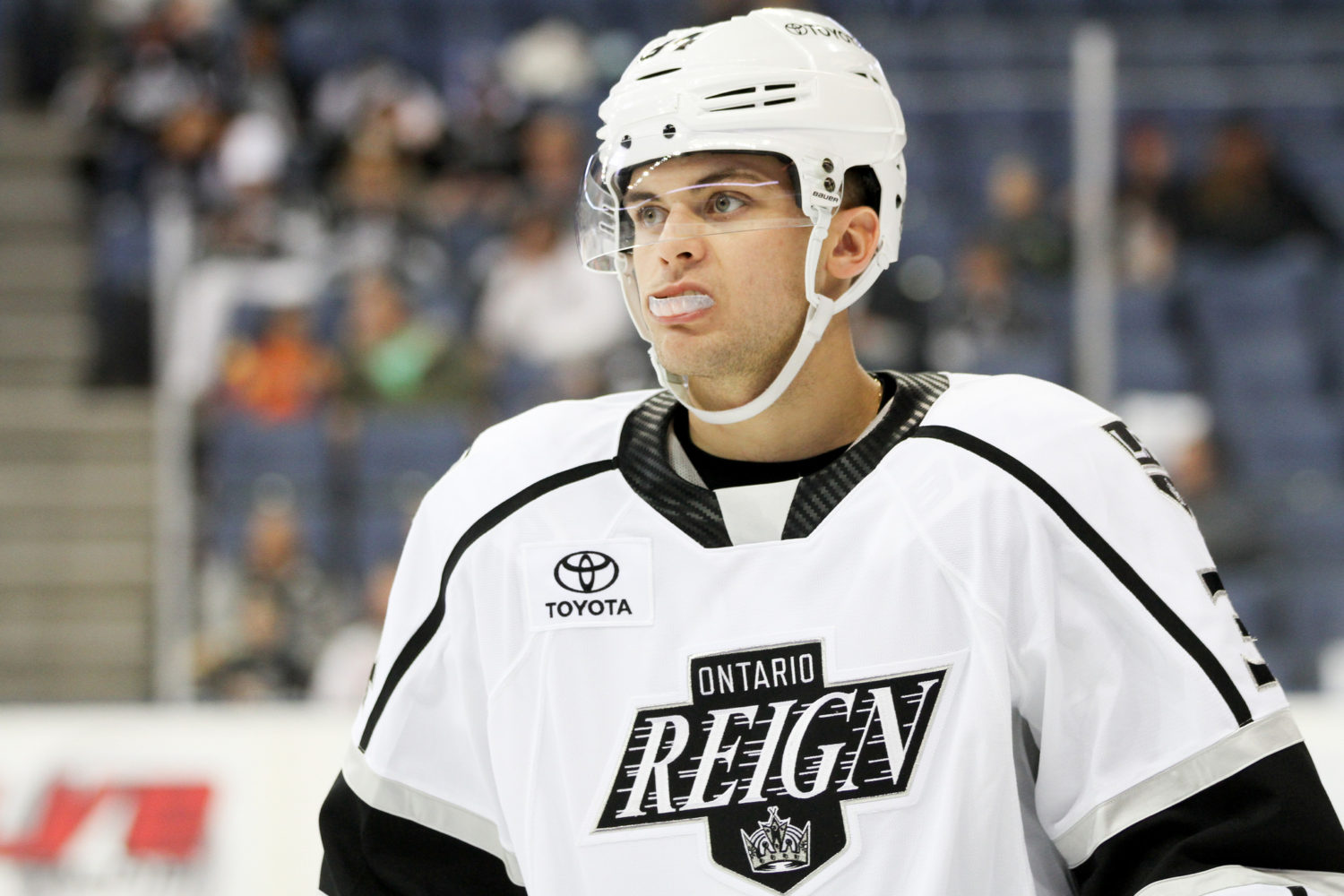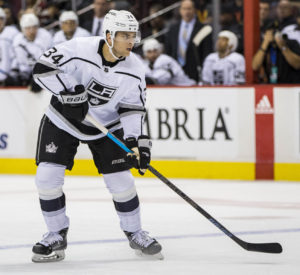The LA Kings’ blue line is in the midst of reform and could take on a thoroughly different look the next time they face the Tampa Bay Lightning on February 25, the NHL’s trade deadline. With the team tied with Ottawa for last place in the league with a .427 points percentage, there are many familiar players who’ve won with Los Angeles that will be under consideration to be exchanged for picks, prospects and assets. Defenseman Alec Martinez and Jake Muzzin – along with forward Jeff Carter – occupy three of the top 16 spots in TSN’s Trade Bait List, with Muzzin clocking in at #2.
Whether the Kings move any rumored defensemen at the deadline or over the summer, there will be a number of younger players vying for a wider role on the NHL club, some of whom are already playing in the NHL, such as Sean Walker, the 24-year-old smooth-skating defenseman who can provide offense and also needs to build his game and his strength in the defensive end. Other players like Paul LaDue, who is 26, are older and will continue to try to chisel out their opportunity, while rookies such as Daniel Brickley, who turns 24 in March and was signed to a free agent contract out of Minnesota State-Mankato last spring, should compete for a more permanent role once promoted again to the big club.
And then there are those who are yet to make their NHL debuts. 20-year-old Kale Clague owns the most hype out of this group, which also includes 23-year-old Alex Lintuniemi, a 2014 second-round draft pick, and 2015 seventh rounder Matt Roy, a physical specimen who turns 24 in March and has also developed and trended well and will draw consideration for a recall.But whichever players the Kings choose to promote, it’s becoming more clear they’re probably going to get a player in Clague, whom they selected in the second round with one of their four total selections at the 2016 NHL Draft. The defenseman has played with a high level of confidence since Walker’s recent promotion and is now a mainstay in all situations for AHL-Ontario, with whom he’s totaled two goals and 14 points in 28 games. Seven of those points have come since the start of December, and while he’s a minus-player over that time, the indications LAKI has received is that management has been encouraged by how quickly it has taken him to adjust to the pro game – this process usually takes some time for 20-year-olds coming out of major junior – and that they’re happy with his development and burgeoning confidence. He’s probably coming in a little bit ahead of where he may have been in advance of last season, and should the Kings part with multiple defenseman in advance of the trade deadline, there’s a decent chance he could make his NHL debut at some point afterwards.
This comes the season after he showed significant improvement at development camp and was a factor in training camp who graded well during his preseason opportunity. While working with Senior Advisor to the General Manager/Development Mike O’Connell and Sean O’Donnell, Player Development over the summer, Clague showed noticeable growth from his 2017 development camp and began to illustrate his development in positioning and working from the tops of the circles down – on the opposite end of the rink from the bread-and-butter offensive game that influenced his selection as the recipient of the 2018 Bill Hunter Memorial Trophy, awarded annually to the Western Hockey League’s top defenseman. “Positional play, boxing out. Winning puck battles,” he said of his focuses in advance of making the jump to the pro game. He’s also shown good improvement in his angles and defensive points of attack.
This stable of interesting defenseman is badly needed by an organization that lost right-shot defensemen Colin Miller and Erik Cernak to trades and left-shot physical stalwart Brayden McNabb to expansion, so Clague checking in perhaps a touch ahead of schedule is of high importance for the organization. More on Clague and his development – including his reflection on his two-year stint with Canada’s world junior team, with whom he won gold last year – is shared below. It includes some insight from O’Donnell, who has become an important figure in the young blue liner’s development both on and off the ice.
Kale Of Duty. pic.twitter.com/y0NaUvxJ78
— Ontario Reign (@ontarioreign) December 17, 2018
Sean O’Donnell, on whether Kale Clague’s confidence comes from taking advantage of an opportunity:
Yeah, yeah. When you’re coming up like that, it’s all about getting opportunities and sometimes the opportunities are through trade, through injury, through call-ups, whatever it is. And it’s important that guys take whatever that opportunity is, whether it’s increased time, certain special teams that maybe they didn’t get on, and run with it. And you’re seeing that with some of the guys up here and I think Kale has really impressed a lot of us with how quickly he’s kind of gotten it, if that makes sense. He had a lot of success in the Western League, defenseman of the year last year, two-time team Canada, and I think his style of play, we’d thought there’d be a little bit of an adjustment, playing against men playing against guys. And there was early on, but I think since about Thanksgiving he’s really kind of turned a corner and he’s really gained the coaches trust. He plays key situations, you can really tell his confidence is coming out, and we’ve been very pleased with his progression so far.
O’Donnell, on working with Clague to accentuate his defensive zone reads and positioning:
Well, positioning is the big thing because there’s a lot of times when you can eliminate a lot of mistakes or having to make the great play defensively if you don’t allow the offensive play to develop because you’re in the right spot. Most of these guys coming up on D … especially because he’s such a good skater, even if he was out of position before, he could take two strides and make up for it and now you can’t. The guys are either as good of skaters or are bigger. You can’t muscle them off the puck the way you could in junior, so that’s the main thing we’ve focused on is a lot of times. These guys will get to the right position and then they’ll drift out of position or they’ll make too much out of it if there’s really nothing there and they’re forcing a play – and he’s kind of embraced that, I think. We want when they have the puck and there’s a green light – go. But, it’s when guys start to try and not join the play, but create the play, that’s when they get in trouble, and it all starts from positioning. I think Kale has really embraced that and realized how important that stuff is in your own end. If you’re in front of the net, two feet one way or the other or your stick on this side or this side, it means the difference, and he’s really been good about understanding that.
O’Donnell, on what has gone behind Clague’s point production:
I think it’s everything. You know, you always hear ‘confidence’ and I think unless people have played, it doesn’t really matter what you do – when you’re confident going in, you do things. You don’t think too much, you just do it because you’re like, ‘I can do this right now.’ And he’s making plays at the offensive blue line that you really can’t teach. He’s doing shoulder shakes and shimmies and he’s leaving guys behind him, and you don’t do that if you’re squeezing your stick or you’re thinking too much, so I just think that again, he’s been put in situations now where he’s getting on, goalie’s pulled last minute and he’s the defenseman out there, power play, five-on-three, he’s the guy out there and players feel that and he’s taking it and running with it and I just think his confidence offensively is really high right now.
Kale Clague, on whether his confidence and production coincides with an expanded role:
Yeah. I mean, you know when guys go up, obviously I want to be that guy. They get the opportunity, so that opens up opportunity for me down here and, you know, I’ve just tried to make the most of it. I’ve think I’m starting to play with a lot more confidence. The last month my game’s gone a long way. I think I’ve taken big strides this year. Obviously a little slow trying to get my feet wet in pro [hockey] at the start of the year and trying to figure out what I can do and what I can’t. And, you know, my defensive game, the coaches have helped me tremendously and been harping on me to get back hard for pucks and being good defensively, so I think I’ve been focusing a lot on that. Over the last month or so I think I’ve just gained a lot of confidence and now I’m starting to show my offensive play and trying to bring that to my game, as well.
Clague, on whether the team shared with him any model of a particular player to emulate:
They haven’t really given me an example of any player to watch or anything, but I think if I’m going to get a chance in the NHL I think I’m going to have to go back hard for pucks, make a good first pass. I think I’ve just been watching a lot of clips with them on what to continue to work on, and like I said, I think those areas have really improved. I think I’m going back hard for pucks and getting there first. I’m starting to make plays, breaking the puck out, which is something they’ve been harping on, and I think when I’m doing that I’m kind of my best. Like I said, if I’m going to play in the NHL, I think I’m have to be a puck-moving defenseman and create offense.
Clague, on any feeling of nostalgia around World Juniors:
It’s pretty cool. Obviously LA’s got a ton of prospects that are playing in the tournament this year, which is good to see. There’s some good players coming up, and it’s good to see them doing well. Obviously, I’m rooting for Canada all the way. (ED: This interview was recorded Wednesday morning.) Haven’t had too much time to watch games, we’ve been on the road a little bit, but I think I’m going to try to watch as many as I can here the rest of the way.
Clague, on what still resonates with him from the World Junior experience:
It’s just short-term competition, you’ve got to come together quick as a group, and you know it’s the only way you can win in those tournaments. Obviously, there’s so many good players on one team, so you have to accept the role you’re given and take advantage and do your job out there. If you’re on a power play – everyone’s a power play guy on that team – there’s only ten guys that are going to play power play between two units, so if you’re on the power play you have to do well and if you’re PKing, just being that energy player on the team, you’ve got to embrace it, and that’s how you win those tournaments.
–Photo credit: Ontario Reign




Rules for Blog Commenting
Repeated violations of the blog rules will result in site bans, commensurate with the nature and number of offenses.
Please flag any comments that violate the site rules for moderation. For immediate problems regarding problematic posts, please email zdooley@lakings.com.